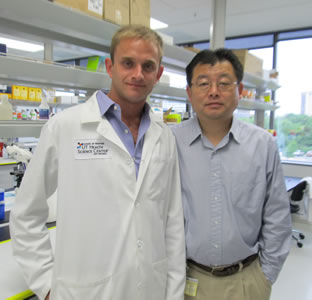UTSA-HSC biomedical engineering graduate student co-founds company

Graduate student Travis Block (left) and faculty mentor Xiao-Dong Chen, M.D., Ph.D., at the UT Health Science Center’s South Texas Research Facility

Graduate student Travis Block (left) and faculty mentor Xiao-Dong Chen, M.D., Ph.D., at the UT Health Science Center’s South Texas Research Facility
(May 1, 2013) -- Graduate student Travis Block is an accidental entrepreneur, you might say. He owns a bicycle-customization business with partners in several cities, even while completing his master's degree in the joint biomedical engineering program of the University of Texas Health Science Center San Antonio and UTSA. He plans to apply to the M.D.-Ph.D. dual-degree program in the Health Science Center School of Medicine.
The San Antonio native and Holmes High School graduate, 23, attended the University of Rochester, N.Y., where he and four classmates developed an adaptive sports attachment for bicycles. The attachment, called the MonoMano Cycling Control System, is designed to make steering and braking possible for wounded warriors, stroke survivors and others who live with deficits on one side.
"The company started as a senior project that we ended up passing," Block said. "We incorporated as MonoMano Cycling Inc. in April 2012. I was a biomedical engineering undergraduate and wasn't planning on doing the thing with the bikes, but we saw how big the need was. A huge number of people, 7 million in the U.S., have hemiparesis -- or unilateral weakness -- and not a lot of exercise equipment caters to them. This is doubly tragic because the chance of a second event goes up if they're not exercising and taking care of themselves."
Customized bicycles can cost consumers $5,000, Block said. The attachment enables wounded warriors and others to take any cycle on the market and get the same utility out of it for one-twentieth of the cost of a customized bike, he said. The $250 attachment clips to the handlebar and gear and brake cables. Riders can apply the front and rear brakes with a single lever and shift the front and rear gears and steer the bike with one hand.
"We took it to an adaptive sports expo, and people asked to buy one," said Block. "We said we have only one, but after they asked, we decided to make more of them."
Block's partners are scattered around the country in New York City, Rochester, N.Y., Baltimore, Md., and Palm Beach, Fla. "We are doing it remotely," he said. "We're all working the company wherever we are. We communicate via email and Skype."
The attachment recently won a da Vinci Award for Accessibility and Universal Design.
Block is completing his master's degree thesis on the use of adult stem cells in tissue engineering. His faculty mentor is Xiao-Dong Chen, M.D., Ph.D., associate professor in the Department of Comprehensive Dentistry and adjunct associate professor in the Department of Orthopaedics at the Health Science Center.
>> Learn more about the UTSA-UTHSCSA joint graduate program in biomedical engineering.
--------------------------------
The University of Texas Health Science Center San Antonio, one of the country's leading health sciences universities, ranks in the top 3 percent of all institutions worldwide receiving National Institutes of Health funding. The university's schools of medicine, nursing, dentistry, health professions and graduate biomedical sciences have produced approximately 28,000 graduates. The $736 million operating budget supports eight campuses in San Antonio, Laredo, Harlingen and Edinburg. For more information on the many ways "We make lives better," visit the University of Texas Health Science Center San Antonio website.
The University of Texas at San Antonio (UTSA) is an emerging Tier One research institution specializing in health, energy, security, sustainability, and human and social development. With nearly 31,000 students, it is the largest university in the San Antonio metropolitan region. UTSA advances knowledge through research and discovery, teaching and learning, community engagement and public service. The university embraces multicultural traditions and serves as a center for intellectual and creative resources as well as a catalyst for socioeconomic development and the commercialization of intellectual property -- for Texas, the nation and the world.
Events
Join the PEACE Center and Wellbeing Services for Denim Day, a day of learning about the importance of consent and why we wear denim on the last Wednesday of the month each April during Sexual Assault Awareness Month. Stop by our Denim Day display to take a photo in front of our Denim Wall, spin the "Is It Consent?" Wheel, and get a Concha or goodie.
Student Union Window Lounge, Main CampusLearn to use Zotero®, a citation manager that can help you store and organize citations you find during your research. Zotero can generate bibliographies in various styles, insert in-text citations and allow you to share sources with collaborators.
Virtual EventThis event will acknowledge graduating seniors from the McNair Scholars program at UTSA before inducting the new cohort of scholars into the program.
North Paseo Building (NPB 5.140), Main CampusAt this memorable celebration, UTSA graduates will be introduced one-by-one to cross the stage and accept their doctoral degrees.
Arts Building Recital Hall, Main CampusRoadrunner Walk is an event for graduating students to have a memorable walk on campus to celebrate an important milestone and their achievements. Graduates will walk along the Paseo while being celebrated by the UTSA community, friends, and family members.
Student Union Paseo, Main CampusCelebrate the accomplishments of College of Education and Human Development, College for Health, Community and Policy, College of Sciences and University College.
Alamodome, 100 Montana St.Celebrate the accomplishments of Alvarez College of Business, College of Liberal and Fine Arts and Klesse College of Engineering and Integrated Design.
Alamodome, 100 Montana St.

